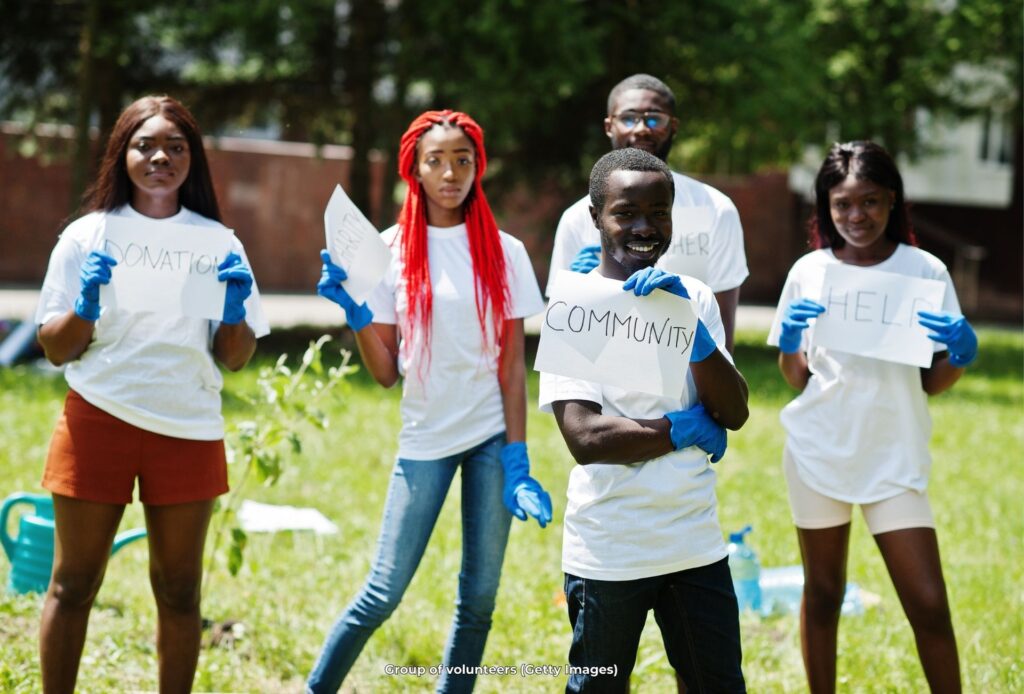Bulungi Bwansi

Credit: ©Getty Images via Canva.com
| Giver: | Community |
|---|---|
| Receiver: | Individual or unstructured/informal group |
| Gift: | Items, Money, Time |
| Approach: | Philanthropy |
| Issues: | 1. No Poverty, 10. Reduced Inequalities, 11. Sustainable Cities and Communities, 13. Climate Action, 15. Life on Land, 3. Good Health and Well-Being, 4. Quality Education, 6. Clean Water and Sanitation, 7. Affordable and Clean Energy, 8. Decent Work and Economic Growth, 9. Industry, Innovation and Infrastructure |
| Included in: | African Philanthropy Narratives |
In the heart of Uganda, where people value cooperation, generosity, and solidarity, a practice that encourages reciprocity, interdependence, sharing, oneness, loving, giving, and a sense of uniting various relationships still lives on. Bulungi Bwansi, which translates to “community service” in the local language, is a practice that involves people working together to address the needs and challenges of their collective communities. These have included collective activities like building schools, cleaning the environment, digging wells, and setting up health centres. This cooperation exemplifies the belief that a community can achieve more by working together.
The Origins of Bulungi Bwansi
Bulungi Bwansi has its roots in the history of Ugandan culture. It is not limited to a specific region or ethnic group; it is a national tradition that spans more than 50 ethnic groups and languages across the country, representing the Ugandan spirit of helping neighbours and fellow community members during times of need. Over the years, it has created a culture of philanthropy, where people give their time, skills and resources to help others without expecting anything in return.
This practice has also contributed to developing vital infrastructure, such as roads, bridges, and water systems, and providing quality services, such as schools, health centres and tree planting. It has mainly been used to benefit communities and community projects as a whole and not usually used in the service of individual needs.
How Bulungi Bwansi is Organized and Planned
Bulungi Bwansi activities are planned through a participatory and consultative process involving community members and local leaders. The community members identify their needs and priorities and propose the activities that they want to undertake. The local leaders facilitate the discussion and consensus-building among the community members, who then collectively contribute whatever resources (time, labour, expertise, money, assets etc.) are needed. Bulungi Bwasi is not a centralized practiced that is regulated or approved by any external body and the State does not get involved in any ways. Rather, it is the collective work of community members with a shared consensus, and its resources, both those in kind and financial are mobilized internally and locally.
The practice is open to everyone, regardless of their age and gender. There are, however, some differences in the participation and roles of different age and gender groups, depending on the type and nature of the activities. Generally, men tend to participate more in activities that require physical strength and skills, such as construction and transportation. In contrast, women tend to participate more in activities that reflect socialised gender roles, such as cleaning, community farming, health-care programs but these roles occasionally get switched. There are, however, also many cases where men and women collaborate and share the tasks equally, especially in activities of common interest and benefit, such as environmental conservation and activities that involve digging.
Bulungi Bwansi is very prevalent in the Buganda (central) region, which has a population of about 10 million, making it the most populous region in the country. It has varying intensity and frequency within the region, depending on the level of awareness, mobilization, and support among the community members and the local leaders. It is a remarkable tradition that showcases the Ugandan culture of collective giving and cooperation and demonstrates the power of working together and the benefits of helping others.
The Impact of Bulungi Bwansi on Ugandan Society
Bulungi Bwansi fosters a sense of unity, responsibility, and resilience among the Ugandan people by bringing together people from different backgrounds at the local community level who share a common vision of improving their communities and lives. Bulungi Bwansi also deepens the philanthropy culture, where people give their time, skills, and resources to help others without expecting anything in return.
Bulungi Bwansi has helped many Ugandan communities to overcome various challenges, such as lack of education, health care and transportation, enabled the development of vital infrastructure, such as roads, bridges and water systems, and the provision of quality services, such as schools, health centers and tree planting. Bulungi Bwansi has also contributed to preserving the environment by promoting sustainable practices, such as recycling, organic farming, and climate change. It is a practice that continues to fill the gaps governments and NGOs are still unable to.
Contributor: Pesh Tumuramye
| Source type | Full citation | Link (DOI or URL) |
|---|---|---|
| Publication |
Buganda Cultural and Development Foundation (BUCADEF).” BUCADEF. Accessed November 11, 2023. |
https://bucadef.org.ug/wp-content/uploads/2022/12/Bulungi-Bwansi.pdf |
| Publication |
The Independent. “Buganda Subjects Urged to Promote Community Service Among Youngsters.” Independent Reporter, October 8, 2019. |
https://www.independent.co.ug/buganda-subjects-urged-to-promote-community-service-among-youngsters/ |
| Publication |
Ssewakiryanga, Richard. “The Meaning and Practice of Philanthropy in Uganda.” Occasional Working Paper No. 01/2022, Uganda National NGO Forum and Centre for Basic Research, Kampala, 2022, pp. 12-21. |
https://ngoforum.or.ug/sites/default/files/publications/Sense%20Making%20Paper%201.pdf |
| Publication |
Capital Solutions. “The Status of Social Entrepreneurship in Uganda.” Kampala, 2020. |
https://www.independent.co.ug/buganda-subjects-urged-to-promote-community-service-among-youngsters/ |
| Publication |
Uganda. “Bulungi Bwansi Brings People Together.” South World, April 1, 2022. Written by Fr. Carmine |
https://www.southworld.net/uganda-bulungi-bwansi-brings-people-together/ |